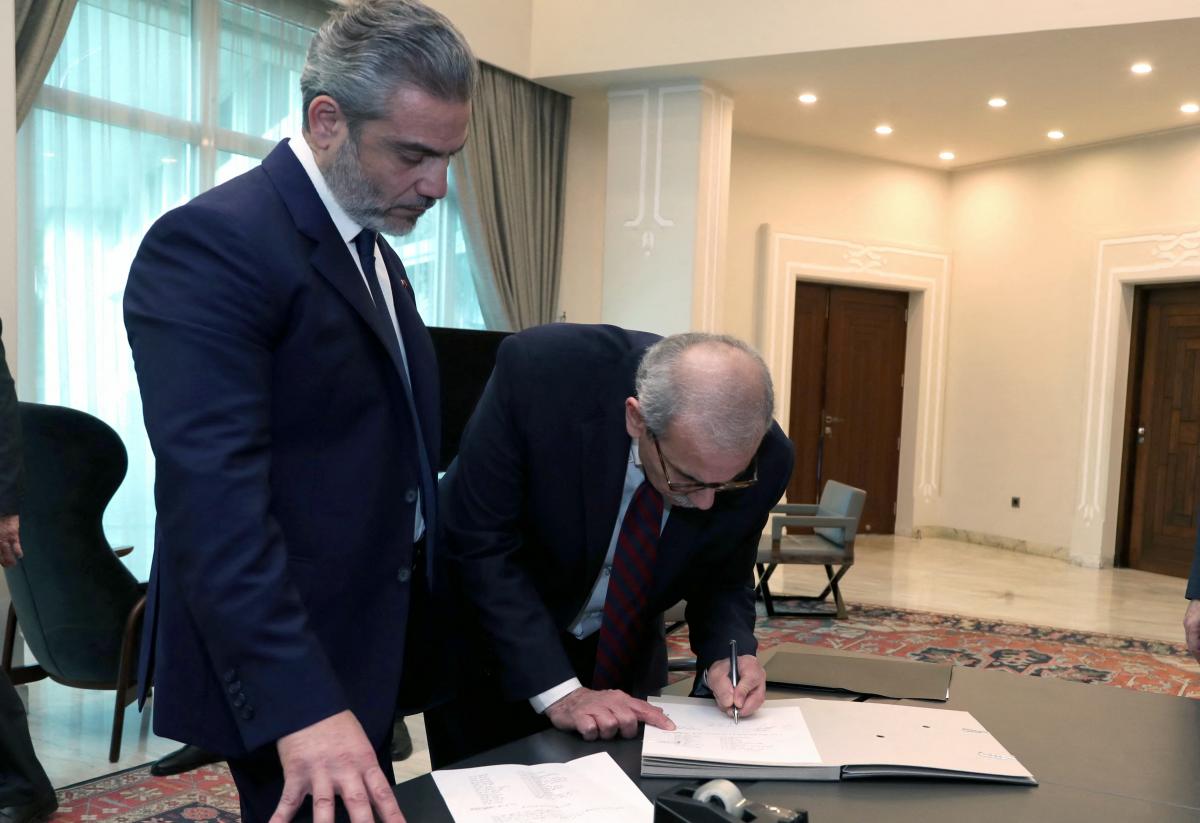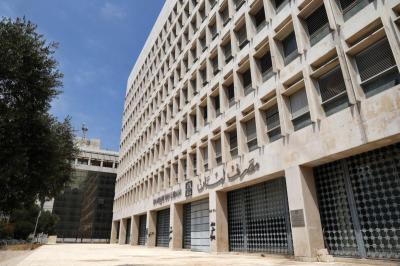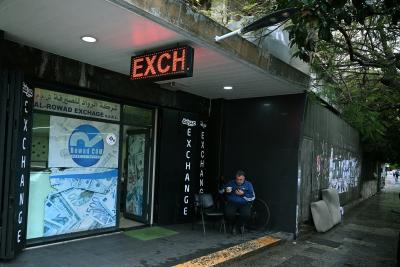According to Transparency International, Lebanon ranks 149th out of 180 countries in the Corruption Perceptions Index, scoring just 24 out of 100. This places Lebanon well below both the global and regional averages, with far-reaching consequences on the political, economic, and social fronts. The international community’s perception of Lebanon continues to erode, mirrored by the growing distrust of its own citizens toward their state and public institutions.
In Lebanon, corruption has evolved from isolated shameful acts into a deeply ingrained culture. Whether it’s the average citizen, a government employee, a businessman, or a political official, corruption has become a means to personal enrichment or a way to expedite affairs, often justified under the guise of “shatara”—a term that denotes cleverness or street smarts. This culture of corruption exploded after the war that ravaged Lebanon (1975-1991), transforming graft into a tool for warlords-turned-politicians to maintain their grip on power.
Perhaps the most tragic example of this rampant corruption was the 2020 Beirut Port explosion, which killed 220 people and caused widespread destruction. The disaster was a direct result of unsafe storage of explosive materials, blatant government negligence, and judicial interference aimed at obstructing investigations into the blast.
The Many Faces of Corruption: A Multidisciplinary Crisis
Corruption can be examined through multiple academic lenses—economics, political science, sociology, psychology, criminology, public administration, and law. Each of these fields offers strategies to combat corruption, yet most converge on a common set of solutions: institutional reform, economic incentives, cultural shifts, and the correction of individual and collective behaviors that enable corruption.
Lebanon adopted a National Anti-Corruption Strategy for the years 2020-2025, but its implementation has stalled due to a lack of political will—though this is not the only obstacle. The economic crisis that has gripped Lebanon since 2020 has fueled corruption at all levels. Despite international pressure and newly enacted legislation, such as the establishment of the National Anti-Corruption Commission, Lebanese authorities have failed to make tangible progress.
Global Governance Indicators: A Mirror Reflecting Lebanon's Failings
This article delves into anti-corruption strategies through the lens of the World Governance Indicators (WGI). Our statistical simulations reveal their profound impact on three critical measures: corruption perception, public trust, and economic performance.
The WGI is widely used by governments, investors, and even tourists to assess governance quality worldwide. These indicators encompass six dimensions: voice and accountability, political stability and absence of violence/terrorism, government effectiveness, regulatory quality, rule of law, and control of corruption. Published annually by the World Bank, the data shows Lebanon performing abysmally across all categories, with consistently negative scores (see Chart 1).
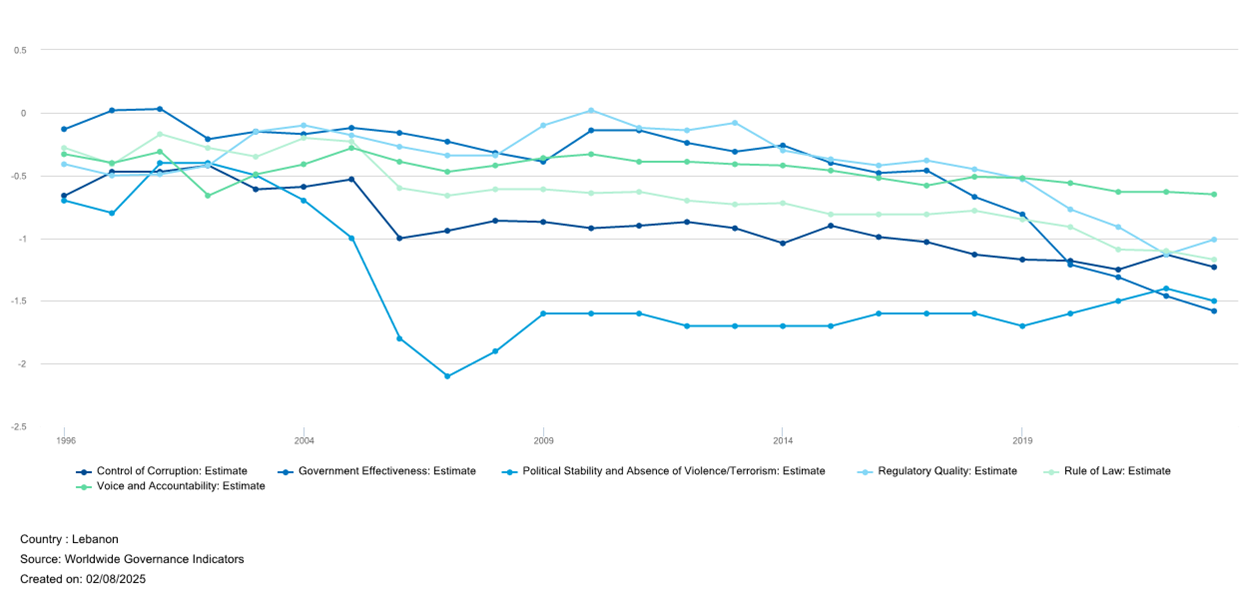 Illustration 1: Global Governance Indicators (Source: World Bank).
Illustration 1: Global Governance Indicators (Source: World Bank).
Our simulations indicate a strong correlation between these governance indicators and three key economic outcomes: corruption perception, public trust, and economic performance. The results suggest that improving governance indicators can significantly reduce corruption, bolster public confidence, and enhance economic output (see Chart 2).
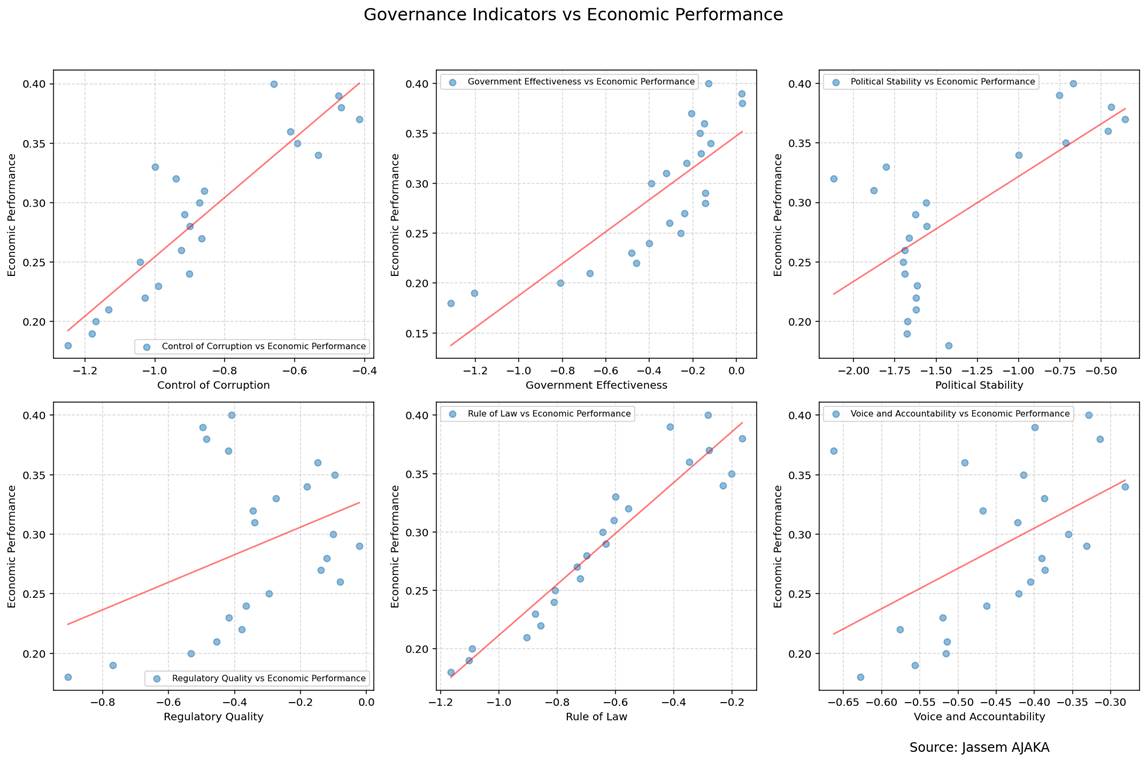 Illustration 2: The Relationship Between Global Governance Indicators and Economic Performance (Source: Our Calculations).
Illustration 2: The Relationship Between Global Governance Indicators and Economic Performance (Source: Our Calculations).
The Catastrophic Impact of Poor Governance on Lebanon
Politically, global governance indicators help policymakers design strategies tailored to their country’s needs. Voice and accountability, for example, are a cornerstone of democracy and a key criterion by which countries are judged on the international stage. Transparency and accountability are essential in the fight against corruption, with the global community exerting considerable pressure on nations where these values are weak. Furthermore, these indicators play a critical role in facilitating international financial aid—aid that Lebanon has been denied in the absence of governance reforms. And what of political and security stability? It remains the bedrock of any functioning society.
Economically, good governance is fundamental to attracting investment, the lifeblood of any economy. Both domestic and foreign investors scrutinize governance indicators before making financial commitments. Economic development is intrinsically linked to sound governance, particularly through the enforcement of property rights, contract execution, and anti-corruption measures.
Socially, the fabric of any society depends on trust in the state and its institutions. When this trust erodes, social unrest becomes inevitable as public dissatisfaction with government performance grows. Effective governance is critical in delivering public services, healthcare, education, infrastructure, and ensuring social justice—all of which depend heavily on the rule of law and the fight against corruption. Civic participation, through mechanisms like voice and accountability, can bridge the gap between governmental actions and citizens’ expectations, fostering social stability.
What Can the Salam Government Do?
So, what can Prime Minister Nawaf Salam’s government realistically achieve in this environment? The answer lies in improving Lebanon’s governance indicators:
1. Voice and Accountability: Strengthening electoral integrity, enhancing parliamentary work, safeguarding freedom of expression and the press, protecting digital freedoms, and promoting civic engagement are key steps. Educating citizens about their rights, involving the public in decision-making processes, supporting civil society, improving access to information, and ensuring judicial independence are also vital.
2. Political Stability and Absence of Violence/Terrorism: Addressing this indicator requires a comprehensive, multi-faceted approach that tackles security, political, social, and economic challenges. This includes promoting inclusive governance, ensuring fair elections, creating job opportunities, fostering economic equality, reforming security institutions, implementing educational programs to counter extremism, and pursuing social justice.
3. Government Effectiveness: To enhance government performance, Lebanon must professionalize public sector management, recruit based on merit, offer training and development, and ensure policy implementation is followed by proper evaluation. Improving public service delivery, promoting digital transformation, fostering transparency and accountability, and strengthening coordination between state institutions are also crucial.
4. Regulatory Quality: Simplifying and standardizing administrative processes, ensuring transparency in legislation, facilitating open access to information, aligning with international standards, and promoting cross-sectoral consistency are necessary for creating a business-friendly environment.
5. Rule of Law: This is one of the most critical indicators for democratic systems, ensuring justice and equality before the law, which in turn fosters economic development, social cohesion, and political stability. Steps include securing judicial independence, enforcing laws rigorously, enhancing legal frameworks, and protecting whistleblowers.
6. Control of Corruption: Fighting corruption is among the most challenging tasks for any country. The most successful nations employ a multi-pronged approach that includes legal, institutional, cultural, and technological reforms. This involves asset disclosure by public officials, the establishment of independent anti-corruption bodies, ensuring judicial autonomy, enforcing laws, increasing transparency in public procurement and government data, limiting cash transactions, tightening financial disclosures, and embracing digital governance.
The Ultimate Test: Political Will
All of these measures depend on the political will of the parties participating in the government. Is there a genuine desire among Lebanon’s political elites to enact these reforms? International pressure is mounting, but at the end of the day, political parties remain the legitimate representatives of the Lebanese people. Therefore, the choice for reform ultimately lies with the citizens.
Please post your comments on:
[email protected]
 Politics
Politics
